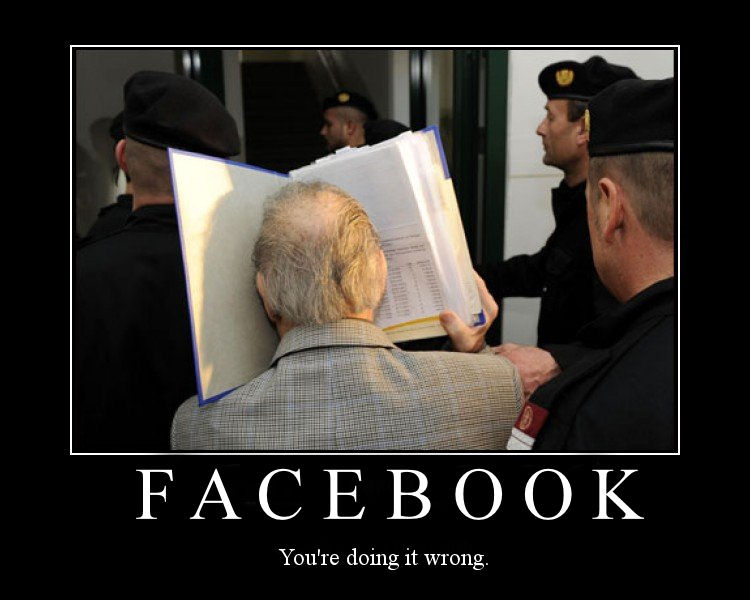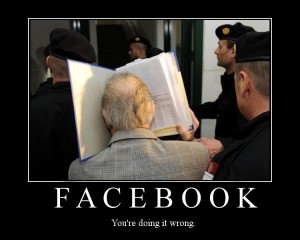- October 28, 2011
- Posted by: Raz Chorev
- Category: Social media

Over the past few years, I had the pleasure of working with many small & medium size businesses, and introducing them to Social Media. Over the past year, I’ve been exposed to the “big end of town”- LARGE organizations, Banks, Insurance giants,and other conglomerates. The difference between them? Very little. The people working in the companies I was called to work with – have very similar view point: They’re all thinking Social Media is another form of an advertising platform, they should ran “campaigns” on it, they must “be on it” ’cause everyone else is, and heading straight into setting up a Twitter page/Facebook account/ Youtube channel, without too much thought or strategy.
I’m now convinced there’s at least one other person sharing my view point. Tamar Weinberg published her rant yesterday, which I was all like: “hey that me!”, “sure is!”, “Did I write this??” etc…
Companies, big and small, would call a “social media guru” to help them set up a Twitter/Facebook/LinkedIn/ blog or whatever, which the consultant (“guru”) can do with their eyes closed. The technical aspects of the social media sites aren’t as complicated as it seems. But now what? Many consultants will look at this engagement with the client, see the $$$ in the ongoing engagement, and would offer (or asked) “to look after and maintain social media”. The first question should be: WHY? Why would you want someone else manage your social media presence? Some of the functions of social media can be outsourced to a professional, especially the technical side of it. However, when outsourcing any part of function of your business, it is absolutely imperative that the service provider will be equipped with the most detailed brief: Who is the target audience, a complete PR policy, including complaint handling, escalation process, tone, legal obligations, etc. The outsourcing company should provide clear and concise goals, objectives, and measurement. Without this information, any activity is Guaranteed to Fail.
Tamar, in her blog post calls it – the Shiny Toy Syndrome. We want it, we want it NOW, and all because it’s all shiny and new. We don’t really know what to do with it, but hey – look how it shimmers in the light!
She suggests setting SMART goals: Specific, Measurable, Attainable, Realistic, and Timely. Setting goals is very important, but if you call on a consultant because you don’t know how to handle Social Media, you’d better do your homework before.
What does it mean? I’ll give a recent example. Yesterday I was approached by a marketing executive of one of the largest conglomerates on the planet (an Oil company). This executive was relocated to Australia, to head a 2 year assignment of getting the local operation up-to-speed digitally and online. He took the first two weeks of the Social Media/online/Smartphone integration project, to talk to people, and know what questions he should be asking. Not the answers – the questions!
Once he knows the questions to ask, then it will be easier to find the people to help with Strategy Creation, and come up with a workable plan. You don’t know what you don’t know, so asking experts which questions you should be asking, is a very clever approach.
What happens when you start with tactics before strategy? You set goals like:
- reach 50,000 Twitter followers
- Get 100,000 likes on Facebook
- Get 20,000 people to follow on LinkedIn.
15 Comments
Comments are closed.


Great outline of what to do and imprtantly what NOT to do…
Thanks, I appreciate it Wayne.
Great post! It’s so easy to get caught up in the Shiny Toy Syndrome and there are so many self appointed gurus saying you just HAVE to get on the latest bandwagon. It’s great to get some advice on what’s actually important.
Thanks, Sharyn 🙂
Raz
Assume you are meaning here that “social media” for companies that sell to consumers rather than social media within the organisations for their employees… As there are many examples of that working successfully.
Eddie
Eddie, I was referring to social media as a paradigm shift for businesses, not only as a campaign/advertising channel or one tool or another. Weather you use social media internally or externally, you should always have a clear strategy, and should allocate sufficient resources towards it, to make it successful. In both uses, you’d be cautious when outsourcing any part of it, wouldn’t you?
[…] recently read Raz Chorev’s post about social media goals, strategies and tactics. Raz questions goals and strategies and his points are undisputable: of […]
In my personal experience, implementation of social media plans is the real ‘bottleneck’. Very often there is not enough dedicated resources on client side and then EVEN BEST STRATEGY FAILS! In more details please read here http://ow.ly/7hehr
Larisa, thanks for your comment. The best strategy won’t fail, as it is the BEST. The strategy will include resources and implementation and timeline, and if followed, it will work. The challenge most strategists face, is poor implementation.
Sure, but there are a lot of people think that strategy is fool-proofed. Thats exactly what i am talking about – poor implementation can kill everything.
Great post Raz, reflecting many of our experiences in dealing with social media. A paradigm shift it is and very often both the engagement aspect and requirement to integrate into existing marketing strategies completely missed. Broadcasting seems to be all too common and certainly no way to gain social media capital in this highly competitive space.
I agree with your views. Social Media Works well if it is done by Internal Staff, therefore training and building capacity for staff to handle Social Media is key. In what is called Hub and Spoke, where Departments manage their own Social Media Campaigns rather than a central hub.
Thanks for your input, Francis. The Hub & Spoke can work, IMHO, only if the actions and day-to-day management is driven by an umbrella corporate strategy.
I am extracting quotes from this article, with your permission of course, to share with a client of mine who is struggling to understand why I am advocating to ‘give up’ agency revenues to manage their social media activity for them – I have proposed that they rather re-organise their marketing function to ensure they are equipped to manage their online presence in-house. Of course, the agency will provide the service of developing their social media strategy but I’m firmly of the opinion that corporates should manage their online rep themselves.
I agree with you completely, Melanie. Agencies have to give up the potential revenue from managing social media activities. Instead, the clients have to invest that money into hiring internal experts to manage their reputation (hopefully some more qualified the 19yo neighbour’s son, who’s “good with this sort of stuff”.)